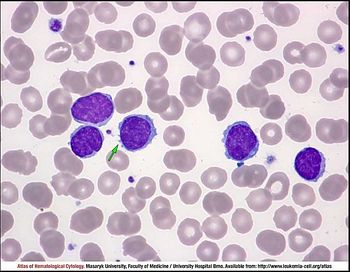
Clinical
Latest News

Latest Videos

CME Content
More News

Revumenib for relapsed/refractory acute leukemias with KMT2A translocation is cost-neutral for health plans, but traditional methods of analysis may not be accurate for rare diseases, said Ivo Abraham, PhD, RN, of The University of Arizona.

John Mascarenhas, MD, discusses phase 1 data showing that INCA33989 is a well-tolerated therapy for calreticulin–mutant essential thrombocythemia, with early signs of efficacy and potential disease modification.

Panelists discuss how managing patients with comorbidities requires careful evaluation to distinguish true Group 1 PAH features from underlying cardiac or pulmonary disease, with a more measured treatment approach and close monitoring for complications.

Panelists discuss how spinal muscular atrophy (SMA) treatment will evolve over the next 5 years, likely incorporating improved gene therapy delivery systems, combination therapies, and rehabilitation models, while maintaining individualized approaches for each patient.

Panelists discuss how communication between clinicians, patients, and payers could improve equitable access to spinal muscular atrophy (SMA) treatments, while acknowledging the complex value assessment of high-cost therapies vs improved quality and length of life.

Panelists discuss how prostacyclin pathway treatments remain important but challenging due to significant side effects and delivery complexity, with sotatercept potentially reducing reliance on parenteral prostacyclins while maintaining their role in high-risk patients with low cardiac output.

Primary and secondary end points were demonstrated in a phase 3 trial of subcutaneous marstacimab as treatment for patients with hemophilia A or B.

Iptacopan targets one of the major proteins involved in the enzymes of the alternative pathway of complement, explains Carla Nester, MD, of Stead Family Children's Hospital.

John Mascarenhas, MD, discusses the rationale, mechanism, and design of the phase 1 INCA33989-101 and -102 trials investigating a CAL-R–targeted antibody for patients with essential thrombocythemia.

On-body delivery systems for subcutaneous isatuximab could enable patient self-administration, according to Xavier Leleu, MD, PhD, improving convenience and transforming treatment for relapsed/refractory multiple myeloma.

Trial Supports Subcutaneous Isatuximab as Effective Alternative to IV Version: Xavier Leleu, MD, PhD
The phase 3 IRAKLIA trial found that subcutaneous isatuximab delivered via an on-body system was as effective and safe as intravenous (IV) administration in relapsed/refractory multiple myeloma, according to Xavier Leleu, MD, PhD.

Rucaparib maintenance improved progression-free survival (PFS) in homologous recombination deficiency (HRD)-negative advanced ovarian cancer, irrespective of baseline prognostic factors.

Long-term CARTITUDE-1 data show ciltacabtagene autoleucel (cilta-cel) may offer lasting remission and survival in relapsed/refractory multiple myeloma, according to Sundar Jagannath, MBBS, of the Icahn School of Medicine at Mount Sinai.

In a cohort of TRANSCEND FL, the chimeric antigen receptor T-cell therapy liso-cel showed a 95% overall response rate in relapsed marginal zone lymphoma, offering hope for improved patient outcomes in challenging cases.

The Beat AML Master Trial found high remission rates and promising safety with triplet therapy in patients with acute myeloid leukemia (AML), according to Ashley Yocum, PhD.

Lorna Warwick, CEO of the Lymphoma Coalition, highlights findings underscoring the vital role of clinician communication in managing adverse effects and supporting patient confidence in lymphoma and chronic lymphocytic leukemia (CLL) care.

Panelists discuss how spinal muscular atrophy is an autosomal recessive genetic disease affecting motor neurons with 3 currently approved disease-modifying therapies that restore SMN protein expression, including 2 requiring ongoing treatment and 1 gene transfer therapy (onasemnogene abeparvovec) approved only for patients under 2 years of age.

Panelists discuss how the pooled 3-year data for delandistrogene moxeparvovec show sustained motor function stabilization and less deterioration compared with natural history, providing confidence in the therapy’s long-term benefits while acknowledging the need for survival data and addressing concerns about potential transgene dilution over time.

Panelists discuss how implementing cardiovascular-kidney-metabolic health requires a team-based approach using the analogy of football, where physicians coach multidisciplinary teams to help patients overcome barriers and achieve health goals.

Panelists discuss how minimal residual disease (MRD) status can guide post-transplant treatment decisions, particularly for high-risk patients who don’t achieve MRD negativity and patients considering discontinuation of long-term maintenance therapy.

A panelist discusses how ITP creates a chronic inflammatory state causing underrecognized symptoms like fatigue and joint pain that significantly impact patients' quality of life and ability to function, while recommending avoidance of activities that could cause head or internal injuries.

Panelists discuss how GLP-1 receptor agonists represent a paradigm shift by providing weight loss, glycemic control, and cardiovascular protection simultaneously, moving focus beyond A1C control to comprehensive risk reduction.

Panelists discuss how quadruplet regimens show improved efficacy over triplet regimens without significantly increased safety concerns, with anti-CD38 antibodies being well tolerated and NCCN guidelines now recommending 4-drug regimens for transplant-eligible patients.

Telitacicept is a dual-targeting agent that attaches to and blocks the effects of 2 key signaling proteins, B-lymphocyte stimulator and a proliferation-inducing ligand, to treat the B-cell–mediated autoimmune disease, generalized myasthenia gravis.

Panelists discuss how insurance challenges impact spinal muscular atrophy (SMA) care, with prior authorizations becoming more streamlined over time but limitations on physical therapy sessions and inequitable access to treatments remain significant barriers.














